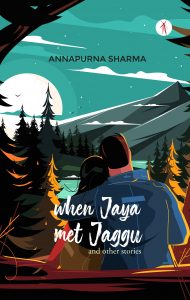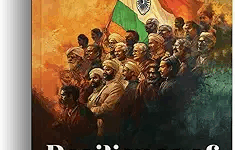 Bookmarked took a break in July as things went out of hand for a while. Now that they seem to be a bit alright, I go back to keying in my thoughts again. Work is on in full swing and classes in person are back as life seems to moving back into the way it was before the pandemic disturbed it all. As I was trying to unclutter things that had piled up, I discovered a slim volume of stories by Annapurna Sharma that reached me a very few months ago. When Jaya met Jaggu and other stories contains nine stories that speak of the human experience. Charting a whole gamut of emotions, the stories speak of love in its myriad forms.
Bookmarked took a break in July as things went out of hand for a while. Now that they seem to be a bit alright, I go back to keying in my thoughts again. Work is on in full swing and classes in person are back as life seems to moving back into the way it was before the pandemic disturbed it all. As I was trying to unclutter things that had piled up, I discovered a slim volume of stories by Annapurna Sharma that reached me a very few months ago. When Jaya met Jaggu and other stories contains nine stories that speak of the human experience. Charting a whole gamut of emotions, the stories speak of love in its myriad forms.
A brief fictional form that deals with a few characters is how most describe a short story. It is because of its size that it usually revolves around a single incident or event, a moment. Inspite of its brevity and size, the genre leaves a great impact in the hands of some great practitioners of the form. Character, thought, plot all converge to create a fleeting moment, a slice of life, an emotional upheaval, a social commentary – the list could go on. This is so true of the stories in the volume under discussion.
Sharma’s stories wonderfully weave in the everyday, the mundane, the routine, in ways that stay on. “When Jaya Met Jaggu” is a story that speaks wonderfully of love, of relationships, of the elderly who struggle to hold on, of how, at times, life seems to slip away and the way in which people begin to matter, of the adjustments needed to make things work out. The story brings in issues of disease and health of the elderly into focus –
There’s a clot in the brain, pint-size, said the doctor. It created mayhem in their lives. Her face lost all lustre and her yes moved chaotically like two black balls bouncing pointlessly in the air. She shifted her focus randomly from one object to another. The title reminded me of the title of a film that deals with friendship and love. Sharma’s story has both these as the central themes woven in beautifully, waiting to be discovered in a way that leaves a nice feeling that lingers on.
In “Jasmine Maid,” Sharma almost recreates the fragrance of the flowers that adorn the hair of women. The flowers and fragrance form an important part of the narrative that speaks of class and privilege in a nuanced way. Malli, the narrator of the story, looks back at her growing up years, her mother slogging it out and being beaten up by her father at night, of the chocolates she gets to eat in the Madam’s house that her mother works in. A world that becomes complicated and abusive for her as she realises that it is no longer a safe place for her and chocolates that she relished as a child now become a recompense for sexual favours that she is forced into.
After several such Sundays, she slowly removed the wrapper of one chocolate and popped it into her mouth. It was bitter. It felt like several spineless creatures wriggling all over her mouth.
The presence of the god Krishna in the story, of the flowers that the little girl offers to the lord are all blurred as she is sexually harassed and is forced to keep quiet and yet she stands in front of the god hoping. The story delicately navigates through dark territories while lingering over some nice moments, commenting on the way life turns out for the lower sections of society forced to eke out a living as a maid.
Each of the stories in the volume – “Coffee Pleasure,” “Pariah in my Backyard,” “Lunchtime,” “The Lame Mango,” “Gods Without Inquest,” “Temple under the Tamarind Tree,” and “Lone Jungle-Crow” bring in myriad ideas and issues that one encounters in life. There is no crowding of themes or issues, rather the coming together of them in a story creates a pattern that is waiting to be unravelled. In some stories, the anger remains, even though the character seems to be at peace and is trying to hold on – as is seen in the “Jasmine Maid.”
Written in a simple, at times, very elegant style the lucidity of expression works to reveal the whole range of human experience that, at times, shock and, at other moments, leaves a smile. Sharma seems to have a penchant for revealing the twists and turns of life in ways that jolt, that make one pay attention to, that makes one ponder. The feeling of alienation and loss remain in some of the stories In “Lunchtime” food serves as an important metaphor with the smell and taste of food figuring importantly in the story. Many of the stories use Telugu and Hindi words as part of the dialogues creating the world that Sharma peoples so well.
*









Add comment